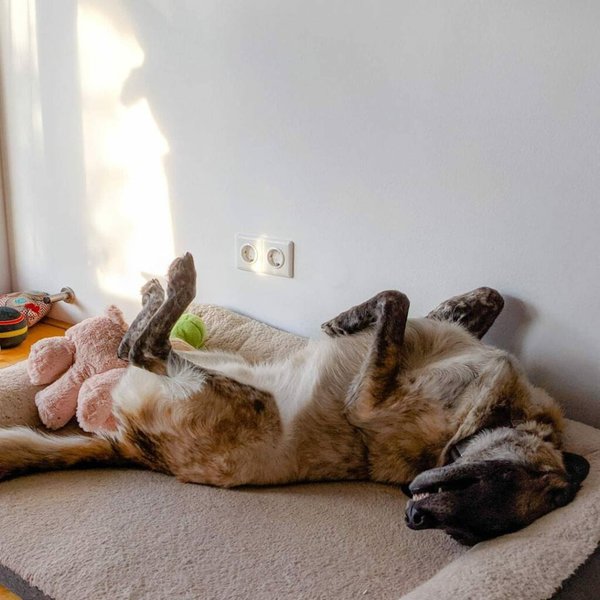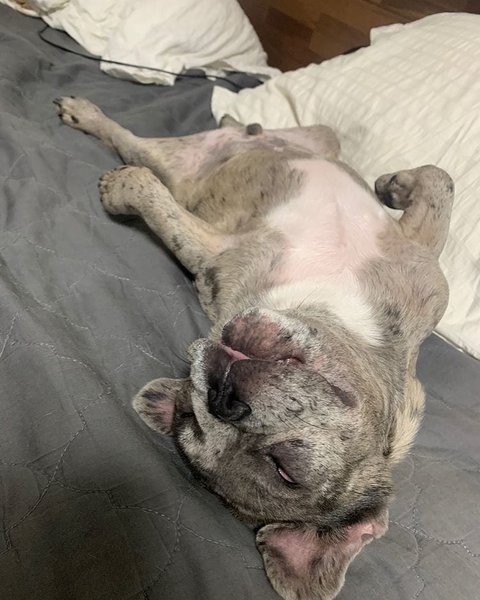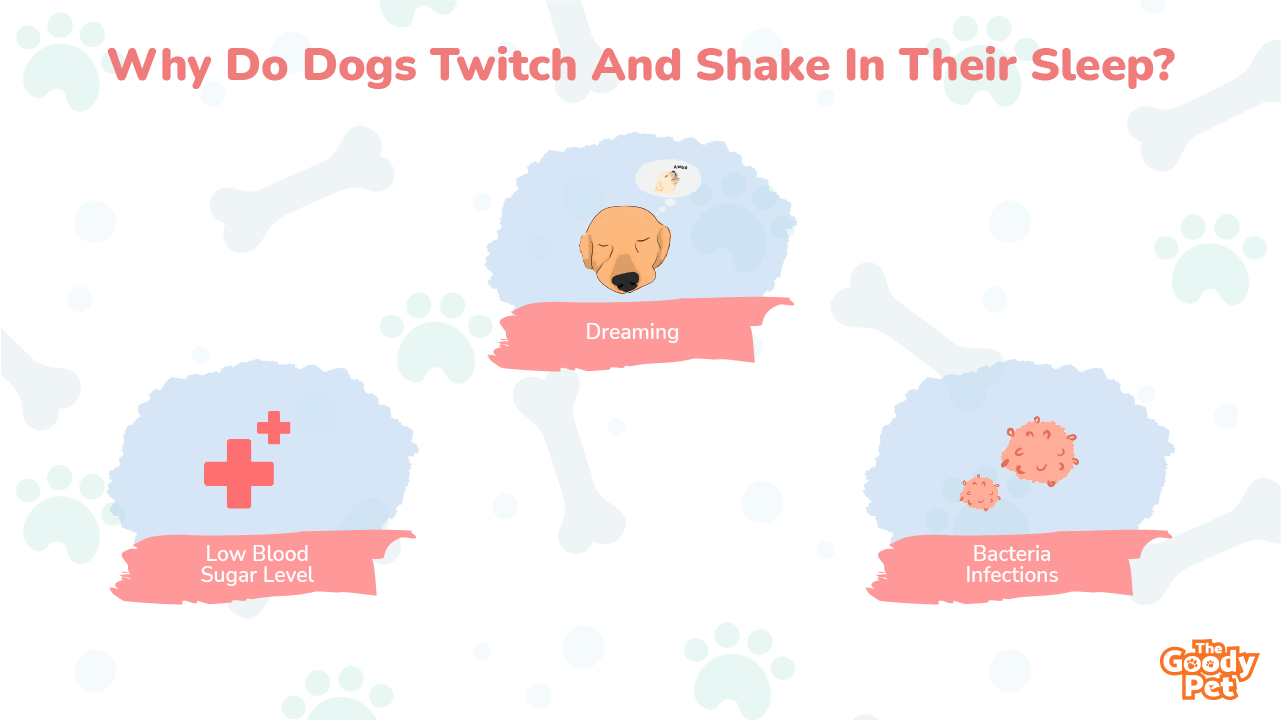If you’re a dog parent, it is likely that you’ll, at one point or the other, witness your dog twitching while asleep, and if you have little to no knowledge of why dogs behave this way, this experience will likely leave you feeling worried. So, why do dogs twitch and shake in their sleep?
Dogs twitch and shake in their sleep mostly because they have dreams. Moreover, it is also possible for a dog’s sleep twitching to be due to seizures caused by an underlying medical condition that you may not be aware of.
Sleep twitching in dogs can have different possible meanings, but this behavior is mainly harmless for the most part. That said, the ability to differentiate between sleep twitching and a seizure is essential to guaranteeing your canine buddy’s safety, and these differences are covered extensively in this article. However, before we go further, let’s examine some of the reasons your dog may be twitching in its sleep.
Why Does My Dog Twitch In Its Sleep?
Dogs twitch in their sleep either because they are dreaming or because they’re suffering from a seizure caused by an underlying medical condition.
Your Dog Is Having A Dream
Dogs, just like humans, are capable of dreaming. And the most probable reason your canine buddy has been twitching and shaking so much in its sleep is that it has a dream.
A dog’s sleep is typically divided into two main stages – the Rapid Eye Movement (REM) sleep and the non-Rapid Eye Movement Sleep (non-REM).
During the REM sleep period, and just as the name suggests, a dog typically experiences quick eye movements, and the pooch’s brain behaves as though it were awake – this is the period where dogs have dreams and twitch in their sleep.
Now, it is difficult to say with certainty what the contents of a dog’s dreams or nightmares are, but researchers have speculated that a dog’s dreams are usually linked to breed-related activities, as well as actions carried out by the pooch during the day or about their favorite things.
Also, for reasons yet to be uncovered, it has been discovered that sleep twitching is more commonly observed in puppies and senior dogs compared to active adult dogs. And it has been speculated that this phenomenon is due to the fact that certain parts of a puppy’s brainstem, specifically the medulla and pons, lack development.
Underlying Medical Conditions
As much as twitching while sleeping is a sign that your pooch is dreaming, there’s a chance that your pooch’s twitches and shakes are due to an underlying medical condition.
Sleep twitches caused by medical conditions are not only dangerous to a pooch because of the underlying diseases, but most times, they interfere greatly with a dog’s sleep, thereby resulting in a decline in the dog’s health.
That said, some of the medical conditions that may cause a dog to twitch while sleeping include:
- Bacteria or parasitic infections
- Low blood sugar level
- Diabetes
- Malnutrition
- Heart diseases
Similarly, if your dog has ingested harmful toxins while awake, it is possible for these toxins to kick in when the pooch is asleep, thereby resulting in sleep twitching and shaking.
Is It Normal For My Dog To Twitch While Sleeping?

It is normal for a dog to twitch while sleeping, but muscle twitching caused by seizures doesn’t bode well for pooches.
For the most part, sleep twitching in dogs is normal behavior, but when you observe signs that suggest your dog is having anything other than a good time or is possibly suffering from some sort of medical condition.
Normal twitches are signified by the dog lying on its side and paddling its paws, and anything different from these signs suggests that something is wrong with your canine buddy.
Twitching observed in your sleeping dog can be due to a seizure instead of dreaming. There are signs indicative of seizure behavior, which include:
- Labored breathing
- Vomiting
- Foaming at the mouth
- Loss of bladder control
- Body stiffening
Also, your dog won’t respond if you call out its name while it’s suffering a seizure, and in contrast to normal muscle twitches, seizures are characterized by continuous, irregular, and erratic body movements.
What Can I Do If My Dog Is Twitching While Asleep?
It is advisable to let your dog continue its sleep if you observe minor twitching, but if you notice signs of a seizure, you should get on the phone with a vet right away!
Leave The Dog To Continue Sleeping
While you may be tempted to wake your canine buddy from its dream, thereby stopping its twitching, the best course of action would probably be to let the pooch just sleep it out.
Interrupting a dog while it has a dream may result in redirecting aggression at whoever is waking it, resulting in a growl or even a bite!
Additionally, dogs get the most rest during this REM period of their sleep, when they typically sleep. And by waking your pooch during this period, you’d be depriving the doggy of some much-needed rest, thereby negatively impacting your canine buddy’s health and overall well-being.

Be Careful If You Have To Wake The Dog
If, however, in addition to normal twitching, you notice your dog looking tense, scared, or crying out in distress while asleep, such a dog may be having a really bad dream, and you may be required to step in and interrupt your canine buddy’s nightmare.
As earlier stated, there’s a chance that your pooch redirects aggression towards you if woken abruptly from its sleep; Hence, if you’re to interrupt your Fido’s bad dream, it’s best that you do it properly.
Stand at a safe distance from the pooch and gently call out the dog’s name repeatedly till the dog wakes. Sometimes, it’s even possible for your voice to break through the dog’s dream barrier and have a calming effect on the pooch.
Call A Vet
As we’ve stated earlier, your dog’s twitching may be due to physical discomfort caused by one of several medical conditions; Hence, if, in addition to twitching while asleep, you observe signs that suggest your pooch is in physical distress, the next point of action is to get on the phone and explain what you’re seeing to a vet.
Based on what you have explained to the vet, you may need to take the pooch in for a thorough and complete physical examination to ensure that its sleep twitches aren’t due to an underlying medical condition. And if it is determined that your dog is suffering from a disease, the appropriate treatment will be provided.





